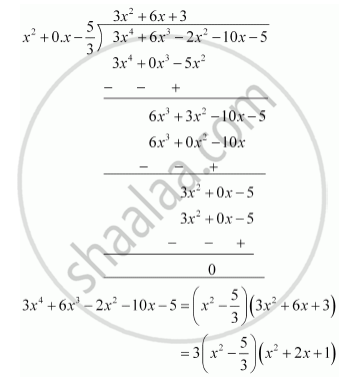Advertisements
Advertisements
Question
Obtain all other zeroes of 3x4 + 6x3 – 2x2 – 10x – 5, if two of its zeroes are `sqrt(5/3)` and - `sqrt(5/3)`
Solution
p(x) = 3x4 + 6x3 – 2x2 – 10x – 5
Since the two zeroes are sqrt(5/3) and – sqrt(5/3).
∴ `(x-sqrt(5/3))(x+sqrt(5/3)) = (x^2-5/3)` is factor of 3x4+6x3-2x2-10x-5
Therfore, we divide the given polynomial by x^2-5/3

we factorize x2+2x+1
=(x+1)2
Therefore, its zero is given by x+1=0
x = -1
As it has the term (x + 1)2 , therefore, there will be 2 zeroes at x = – 1.
Hence, the zeroes of the given polynomial are `sqrt(5/3)` and – `sqrt(5/3)` , – 1 and – 1
APPEARS IN
RELATED QUESTIONS
On dividing x3 – 3x2 + x + 2 by a polynomial g(x), the quotient and remainder were x – 2 and –2x + 4, respectively. Find g(x)
Give examples of polynomials p(x), g(x), q(x) and r(x), which satisfy the division algorithm
deg q(x) = deg r(x)
Find all zeros of the polynomial f(x) = 2x4 − 2x3 − 7x2 + 3x + 6, if its two zeros are `-sqrt(3/2)` and `sqrt(3/2)`
What must be subtracted from the polynomial f(x) = x4 + 2x3 − 13x2 − 12x + 21 so that the resulting polynomial is exactly divisible by x2 − 4x + 3 ?
Find all zeros of the polynomial 2x4 + 7x3 − 19x2 − 14x + 30, if two of its zeros are `sqrt2` and `-sqrt2`.
Find all the zeros of the polynomial x3 + 3x2 − 2x − 6, if two of its zeros are `-sqrt2` and `sqrt2`
It is given that –1 is one of the zeroes of the polynomial `x^3 + 2x^2 – 11x – 12`. Find all the zeroes of the given polynomial.
Show that every positive odd integer is of the form (4q +1) or (4q+3), where q is some integer.
Find the quotient and remainder of the following.
(8y3 – 16y2 + 16y – 15) ÷ (2y – 1)
What will the quotient and remainder be on division of ax2 + bx + c by px3 + qx2 + rx + s, p ≠ 0?
